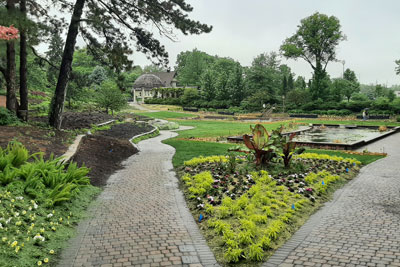Lincoln Biochar Initiative
Biochar is a charcoal-like substance produced from wood waste that can be used as a beneficial soil amendment. It is a lightweight, black material derived from biomass heated to high temperatures in an environment devoid of oxygen. It is composed of high levels of stable, mineralized carbon - typically over 75% by mass.
 (JPG, 366KB)
Biochar was applied to Lincoln's Sunken Gardens in spring of 2022
(JPG, 366KB)
Biochar was applied to Lincoln's Sunken Gardens in spring of 2022
Lincoln’s plan is to capture community wood waste – including trees removed due to the Emerald Ash Borer – for biochar production and use it to support tree plantings, urban agriculture, public gardens, backyard gardening, composting, and stormwater treatment. Lincoln is in the process of building its first biochar production facility, which is expected to be operational in the summer of 2024.
Lincoln is one of three cities in the U.S. that was awarded startup funding and technical assistance from Bloomberg Philanthropies to begin a municipally-owned biochar production program. The program has also received funding from the U.S. Department of Agriculture and the Nebraska Forest Service. The University of Nebraska, which has conducted nearly 10 years of research on biochar, is a program partner.
The biochar we are anticipating producing would be 80%-90% pure carbon by mass. When you apply this carbon into the soil, it is permanently sequestered and will not re-enter the atmosphere for at least several hundred years. Anecdotal evidence shows that biochar produced 2000 years ago is still stable in the Amazon Rainforest Basin.
In addition to its carbon sequestration potential, biochar provides numerous soil health benefits:
-
Water conservation
Biochar holds over two times its weight in water on average. This means you will be utilizing less water to achieve the same level of production in a garden – especially during periods of drought.
-
Enhanced soil structure
Biochar helps to stabilize other forms of soil carbon such as compost. Biochar can substantially increase the lifespan of compost or manure in your soil and can help to hold its fertility.
-
Improved composting
Co-composting with biochar allows you to “charge” the biochar with the nutrients found in your compost pile. In addition, biochar tends to decrease compost odor and residence time.
-
Healthy soil ecosystem
Biochar provides habitat for micro-organisms in the soil, including fungi, bacteria, nematodes, and other soil microbes. A healthy soil ecosystem not only provides a benefit to your garden but has also been shown to further sequester carbon by increasing the biomass in the soil.
-
Soil nutrient retention
Biochar’s high surface area helps your soil to retain nutrients. Biochar also holds an electrical charge, which can substantially raise your soil’s Cation Exchange Capacity (CEC), an important indicator of soil fertility.
-
Contaminant reduction
Biochar has been shown to decrease the mobility and bioavailability of lead and cadmium, especially at higher application rates. These heavy metals are toxic when present in high amounts in soils. Biochar can help with contaminated site remediation.
Biochar application is simple:
Biochar is usually applied with compost and is integrated into the top 6-8” of soil. It is important to apply biochar on a calm day as it can be blown away in Nebraska’s strong winds.
Biochar should be applied at about 8-10 tons per acre as a final rate. This is best achieved by applying biochar several seasons in a row.

For More Information
For more information or to find out how you may obtain biochar, please contact:
Kim Morrow
Chief Sustainability Officer
kcmorrow@lincoln.ne.gov
402-441-5633